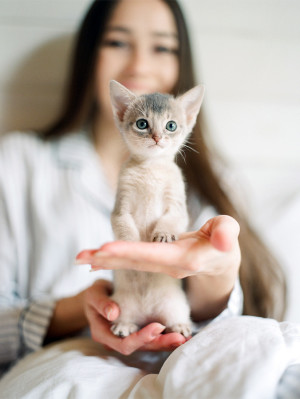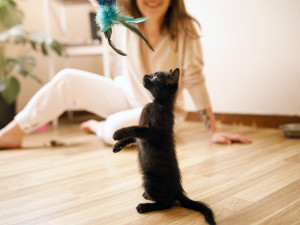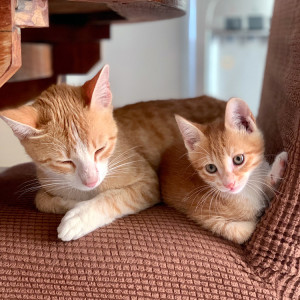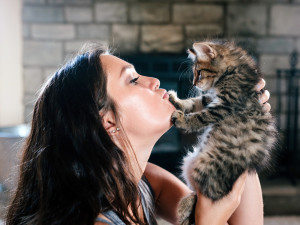How to Determine a Kitten’s Age
There are a few factors to consider.
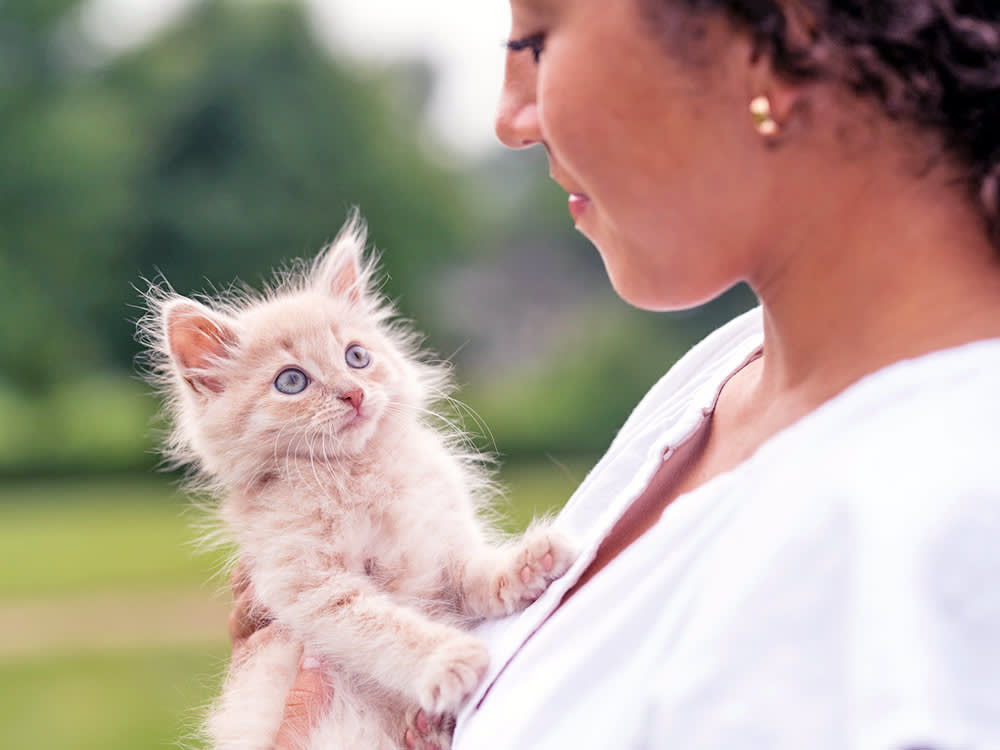
Share Article
In This Article:
How To Tell a Kitten’s Age Developmental Milestones Kitten Age Chart Timelines Last Resort: Kitten Weight By Age Frequently Asked Questions
Estimating a kitten’s age hinges on observing key milestones. These developmental milestones include physical changes like eyes opening and teeth erupting, as well as behavioral advancements in mobility and coordination. Kitten size and weight can vary based on breed, litter size, and other factors.
How to tell a kitten’s age
Welcoming a new kitten into your home can be an exciting and joyful experience. Whether you planned on adopting a kitten or you got suckered by a cute street kitten, knowing a kitten’s age serves as a guide for you to provide appropriate care. Age will dictate:
What a kitten should eat
How much a kitten should eat
How much sleep a kitten should get
How well a kitten can fend for themselves
How much trouble a kitten can get into
What type of veterinary care a kitten needs
So, how can a vet tell how old a kitten is? Veterinary professionals use a combination of physical characteristics and behavioral cues to determine a kitten’s age. Physical characteristics can include teeth, eyes, and ears. Behavioral cues can include whether a kitten is crawling or walking.

Developmental milestones
Many kitten experts use common developmental milestones to determine a kitten’s age. These milestones include:
Tooth eruption
Eyes and ear opening
Eye color and vision
Coordinated walking
Urinating/defecating without assistance
Kitten age timeline
Pinpointing a kitten’s age can be challenging for the uninitiated. Kittens grow fast and go through many developmental milestones just in the first few weeks of life. This kitten-age timeline and weight chart above can provide a roadmap to guide new kitten parents through the initial stages of kitty growth and development. Below, there are more details included as to what you can look for as your kitten grows.
Newborn
Kittens are born defenseless. Their eyes and ears are closed. Their teeth have yet to erupt. The remnants of their umbilical cords are prominent, but this should be gone within three days. Their mobility is typically limited to shimmying to find the closest spot on their mom to nurse.
One to two weeks old
During the first two weeks, kittens’ eyes will open; however, their eyes will appear blue and hazy, and their vision will be unfocused. Ears will unfold and ear canals will open. Kittens are able to crawl with more intention, though they may still be a little clumsy. They are still reliant on their mom for food, warmth, and to be stimulated to poop and pee.
Three to four weeks old
Kittens graduate from crawling to walking. They also progress from needing stimulation to pee and poop to being able to do that on their own. Their first baby teeth start to come in: just the incisors and canines initially.
Four to six weeks old
Kittens’ eyes change color from a hazy grayish blue, to whatever color their genetics dictate them to be. Baby premolars erupt. At this stage, kittens can start to be weaned from nursing and transitioned to a more solid diet.
Eight weeks old
A full set of baby teeth will erupt by the time kittens reach eight weeks of age. Beware: those tiny teeth can be sharp. Kittens should be completely weaned and eating food formulated for growth.
Twelve weeks old
At this stage, kittens are playful and adventurous. They should have gotten the hang of using a litter box and started grooming themselves. Kittens start to get adult teeth, and teething behavior can develop.
Four to twelve months old
Though most cat parents won’t see a single baby tooth fall out, kittens will grow a full set of adult teeth during this time. Cats reach sexual maturity at around six months of age, so kitten parents with female cats may witness their kitten’s first heat cycle. Most cats will stop growing once they reach one year of age.
Kitten weight by age
Body weight can be a helpful tool when trying to determine a kitten’s age, but it is not as reliable as developmental milestones. A kitten’s weight can be affected by breed, litter size, nutrition, and overall health of the litter and the queen. Once again, here’s a general guideline for how much should kittens weigh:
Birth weight: The average kitten birth weight is about 100 grams.
One to two weeks: Kittens should gain about 10-15 grams of weight each day. They should surpass 200 grams in the first two weeks.
Four weeks: 460 to 550 grams
Six weeks: 600 to 700 grams
Eight weeks: 800 to 1,000 grams
12 weeks: 1,300 to 1,400 grams
Four to 12 months old: four to 10 pounds
When is a kitten’s weight concerning?
Kitten growth should be rapid, especially in the first several months of life. If a kitten is losing weight, that’s a problem. Kittens should be evaluated by a veterinarian if they are losing weight, not steadily gaining weight, or gaining weight too slowly.
Lack of weight gain may be a sign of congenital disease or lack of nutrition. Your vet can check for obvious abnormalities. They may recommend supplementing an underweight kitten with bottle feedings.
FAQs (People also ask):
How long do cats live?
Cat lifespan varies by breed, lifestyle, genetics, and overall health. Indoor cats live about ten to sixteen years on average. Cats that roam outdoors tend to have shorter lifespans.
When do kittens outgrow the chewing phase?
Kittens can be very curious (and destructive). Not all kittens will outgrow the chewing phase. Chewing can be a sign of boredom, stress, or a health issue. Cat parents should provide plenty of enrichment and activities to ward off unwanted chewing.
At what age is a kitten no longer a kitten?
At one year of age, a feline is not a kitten, but not yet a full-grown adult. Most of their growth is complete, and nutrition demands change. But having their first birthday doesn’t mean they’ve outgrown their silly kitten ways.
References
Feline Development, From Kitten Kindergarten Onwardopens in new tab
Feline Pediatrics: The First Four Weeks — 38th Annual OAVT Conference & Trade Show
Assessment of Body Weight for Age Determination in Kittensopens in new tab

Dr. Alycia Washington, DVM, MS
Alycia Washington is a small-animal emergency veterinarian with over 10 years of experience based in North Carolina. She works as a relief veterinarianopens in new tab and provides services to numerous emergency and specialty hospitals. She also works as a veterinary writer with a focus on educating pet parents.
Related articles
When Can a Kitten Leave Their Mom?
And why it’s important for their health to stay with her as long as possible.
Kitten Teething: Do Kittens Lose Their Teeth?
Get those little chompers ready for the kitten tooth fairy.
![Woman playing with a black kitten.]()
5 Kitten Behavioral Milestones You Should Know
Keep track of all their fun phases with these guidelines.
![Young woman showing gray kitten.]()
5 Development Stages You Should Know When You Get a Kitten
What to expect from birth to 16 months.
![Ginger cat mom and kitten resting.]()
Kittens Really Need Their Moms—Science Says So
The “I’m just a baby” TikTok sound definitely applies here.
![Woman holding brown kitten to her face.]()
8 Myths About Your Kitten—Busted By a Behaviorist
Forget everything you think you know about baby cats.

